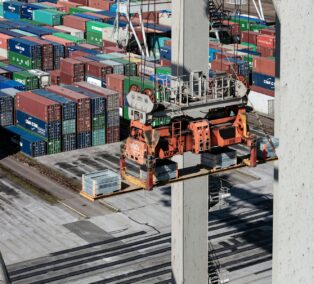The Power of Machine Learning in Logistics
Machine learning has emerged as a powerful tool for optimizing delivery routes and schedules for logistics companies in Saudi Arabia, UAE, and beyond. With the rise of e-commerce and the increasing demand for efficient delivery services, businesses are turning to AI-driven solutions to streamline their operations and meet customer expectations. In this article, we explore how machine learning algorithms are revolutionizing the logistics industry by improving route planning, reducing transportation costs, and enhancing overall efficiency.
One of the key challenges for logistics companies is determining the most efficient routes for delivering goods to customers. Traditional route planning methods often rely on static maps and predefined schedules, which may not account for dynamic factors such as traffic congestion, weather conditions, or delivery volume fluctuations. Machine learning algorithms, however, have the ability to analyze vast amounts of data in real-time, including historical traffic patterns, weather forecasts, and customer preferences, to dynamically optimize delivery routes and schedules.
Benefits for Logistics Companies
By leveraging machine learning algorithms, logistics companies can achieve several benefits. Firstly, they can reduce transportation costs by minimizing fuel consumption and vehicle wear and tear through more efficient route planning. Secondly, they can improve delivery times and customer satisfaction by ensuring that goods are delivered promptly and reliably. Additionally, machine learning algorithms can enable logistics companies to adapt quickly to changing circumstances, such as traffic jams or road closures, by automatically rerouting vehicles in real-time. Overall, the integration of machine learning into logistics operations offers significant opportunities for cost savings, operational efficiency, and customer service improvement.
Implementing Machine Learning in Logistics Operations
Integrating machine learning into logistics operations requires a multi-faceted approach. First and foremost, logistics companies need to invest in robust data collection and analytics infrastructure to gather and process the necessary data. This includes deploying sensors and GPS tracking devices on vehicles to collect real-time location and performance data, as well as leveraging data from external sources such as traffic management systems and weather forecasts. Once the data is collected, machine learning algorithms can be trained using historical data to predict future traffic patterns, optimize route planning, and schedule deliveries more effectively.
Furthermore, collaboration with technology partners and AI experts is essential for developing and deploying machine learning solutions tailored to the specific needs of logistics companies. By working with experienced AI professionals, logistics firms can ensure that they are leveraging the latest advancements in machine learning technology and applying them in ways that maximize efficiency and effectiveness. Additionally, ongoing monitoring and refinement of machine learning models are necessary to ensure optimal performance over time, as external factors and operational conditions may change.
As logistics companies in Saudi Arabia, UAE, and other regions continue to embrace digital transformation, the adoption of machine learning in delivery route optimization will play a pivotal role in driving operational excellence and maintaining competitiveness in the rapidly evolving market. By harnessing the power of AI-driven analytics, logistics firms can unlock new opportunities for growth, efficiency, and customer satisfaction, ultimately positioning themselves for long-term success in the dynamic logistics industry.
The Advantages of Machine Learning in Logistics
Machine learning offers several significant advantages for optimizing delivery routes and schedules in the logistics industry. One key benefit is the ability to analyze vast amounts of data in real-time, allowing logistics companies to make informed decisions quickly. By processing data from various sources such as traffic patterns, weather conditions, and historical delivery routes, machine learning algorithms can identify optimal routes that minimize travel time and fuel consumption while maximizing delivery efficiency.
Moreover, machine learning enables predictive analytics, allowing logistics companies to anticipate potential disruptions and proactively adjust delivery schedules accordingly. By forecasting traffic congestion, weather events, or other factors that may impact delivery operations, machine learning models can recommend alternative routes or adjust delivery times to minimize delays and ensure timely deliveries. This proactive approach not only improves customer satisfaction but also reduces operational costs associated with inefficient routes or delayed deliveries.
#MachineLearning #LogisticsOptimization #AIinSupplyChain #RoutePlanning #DeliveryScheduling #SaudiArabia #UAE #Riyadh #Dubai #BusinessSuccess #ManagementConsulting























